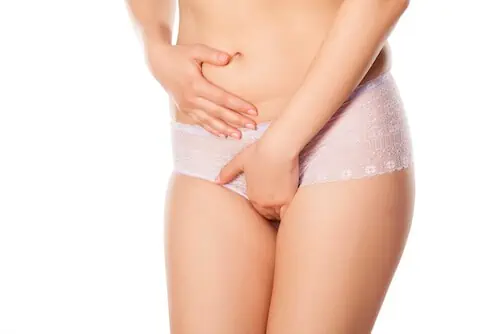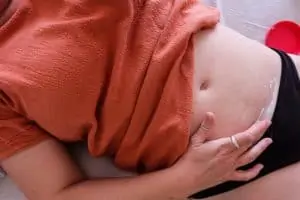Yeast infections are a pain in the, well, you know what. If you’ve ever had one, you know how annoying it is. And the smell! Ugh!
But did you know you can get a yeast infection on a c-section scar? You may even get a yeast infection on a c-section scar years later.
The smell will likely clue you into that yeast infection on your c-section incision. But you’ll probably notice some other things too.
Before you panic (and let me remind you NOT to panic), you should know that a yeast infection on a c-section incision is actually quite normal.
It did not happen to me personally, but this is very ordinary, and you shouldn’t be worried. Let’s discuss this more so you’ll know what to do if it happens to you.
Is it common to get yeast infections back in the C-section incision area?
Let me start by saying yes. It’s common to get c-section yeast infections. And it’s common for them to come back even years later.
See, your body takes a long time to heal, whether you have a c-section in advance or an emergency c-section. Much longer than a normal delivery.
Even though we’ve come a long way in medical advancements, yeast infections can still pester you as you recover. It’s certainly the case in your postpartum days. You can get yeast infections on the c-section incision and urinary tract infections. And yes, you may still get yeast infections where you are used to seeing them.
When it comes to infections of the c-section incision, a yeast infection is the most common one. It will feel itchy and uncomfortable. While c-section incisions feel slightly itchy from the nerves impacted during surgery, this kind of itching is different.
The candida, that annoying fungus, is responsible for this. It loves those warm and moist environments, as you know. And your surgical site is one of them.
Why does this happen?
It’s because, after surgery, your skin is moist under that dressing. And if your clothing is too tight, you could make it more humid around that wound, providing the perfect growth conditions for this unwanted visitor.
But some people will be more prone to c-section yeast infections and reoccurring ones due to certain factors. For one, if you are obese, you will be more likely to have this happen.
Others with diabetes, HIV, or anyone on long-term steroids may suffer a similar fate. You have a greater risk if you’ve had a c-section before, especially if you’ve had a long labor or excessive blood loss during that time.
Furthermore, you may notice more vaginal yeast infections after delivery through a c-section simply because the antibiotics you’re given after surgery may make it easier for it to thrive.
BUT WHY?!?
I know, that’s so frustrating. But remember, antibiotics are meant to kill bacteria in the body. You want this to keep harmful pathogens from infecting you. Unfortunately, antibiotics do not discriminate and kill ALL the bacteria, even the good stuff that helps you.

So when you’re missing that good bacteria in your body, you will be much more likely to get a yeast infection. Often, this will happen in your vagina. But you can get it in your c-section incision too.
How do I know if I have a yeast infection on my c-section?
Whether you have just had your c-section or you had one years ago, you could get a yeast infection on your incision.
If you’ve had a yeast infection in your vagina or your c-section was previously affected, you may clue into it more quickly.
But if not, you will want to keep an eye on your c-section incision; even when you’ve got a kid in preschool, you’ve delivered via c-section.
You’ll likely see some redness or swelling on your incision. You’ll see some pus leaking, probably have a fever, and feel like it’s hard to go pee. Skin will itch, and the biggest telltale sign, of course, is the smell.
In other words, you won’t feel right, and you’ll KNOW something is completely off. Even if you aren’t sure it’s a yeast infection, your c-section incision should hurt less and less as you recover from your surgery. If it suddenly becomes painful years later, you need to see the doctor to get treatment.
How do I prevent this from happening to me?
The good news is that you can do a lot to prevent this from happening to you. Please note that for some of you, even the best prevention may still result in a yeast infection on your c-section, but it’s worth a shot to minimize your risk.
- Hygiene
For one, hygiene is always the key. Make sure you’re keeping your skin clean, especially around that incision. If you’re out of the hospital, follow what the doctors and nurses tell you to keep it clean and care for it. In this area, it’s also best to avoid scented sprays, lotions, and bath products.
- Clothing
What you wear is so important too. If you wear tight clothing for a long time, you will create the perfect conditions for a yeast infection to thrive on your c-section incision. Make sure it’s breathable and loose.
- Take care of yourself
I know it’s hard when you’ve got a little one to handle, even harder when you’ve got more of them, but please, get that sleep. Eat nutritious foods most of the time and exercise.
- Add good bacteria to your diet
Now that we know so much about gut health, you can replenish the good bacteria in your body and have them help you. If you eat more yogurt, kimchi, sauerkraut, or any fermented foods, you’ll be giving yourself a nice dose of the good stuff to help you stay in good health.
What do I do if I have a yeast infection in my c-section?
Contact your doctor if you’ve recently had that c-section or if it’s been years. Even if you have a yeast infection, let your doctor check to be sure. You’ll likely be put on prescription antibiotics and be well on your way to feeling better soon.
Don’t let it fester, though. If you’ve been reading my articles on what a normal incision should look like and what an infected one looks like, get treatment immediately if you notice anything unusual.
As a rule of thumb, your c-section incision should not smell, leak, or hurt excessively. While it will take time to recover immediately after, years later, your c-section incision should not be described as painful. If that’s what it feels like, get that taken care of so you can feel better soon!
Leslie Berry lives with her husband and two young daughters in Los Altos, California, where she loves helping other moms get comfortable with motherhood and embracing the insanity with facts peppered with laughs.
She loves eating too much sushi, exercising, and jamming out on her Fender. Read more about Leslie here.






